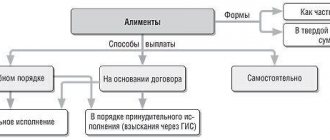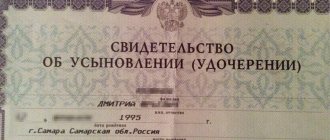Adoption is a legal procedure that legitimizes the placement of children left without parental care. According to Art. 124 of the IC, adoption occurs only of minor children and based on their interests.
Children are adopted by citizens of the Russian Federation, foreigners or stateless persons who are not their relatives, upon completion of a one-year period from the date of receipt of information about children who were left without parental care in the state data bank.
Important! If you are dealing with your own case related to child support for an adopted child, then you should remember that:
|
Do I need to pay child support for an adopted child?
After adoption, adopted children receive the same status as their own children.
The following adoption options are possible:
- the mother entered into a new marriage, the new spouse adopted the children after the second parent renounced paternity;
- the baby was accepted into the family after the parents were deprived of their rights in relation to him or after their death;
- the second parent entered into a new marriage after the death of the first with the subsequent adoption of children by the new spouse;
- one of the spouses was deprived of parental rights, the second started another family after a divorce, the new spouse adopted a minor.
In all of these cases, the adoptive parent receives the status of a parent after a court decision is made. From this moment, blood relatives lose their rights and obligations in relation to the minor.
You should know! If, before being accepted into a new family, alimony was assigned to a minor from the blood mother or father, then after adoption the obligations to pay them cease (clause 2 of part 2 of Article 120 of the RF IC).
Rights of adopted persons
Adoption is one of the forms of placing a child into a family. The procedure is carried out in several stages and ends with the registration of a record that the parents of the minor are his adoptive parents.
As for the legal status, adoptive parents and adopted children are considered equal to relatives by origin. And at the same time, such children lose their legal connection with their biological parents.
The court in its decision may indicate, at the request of one of the relatives, the preservation of the connection between him and the child.
Who must pay child support if the child is adopted?
Since the new family acquires all the rights and responsibilities of the natural mother and father, they are obliged to support adopted children. After a divorce, the responsibilities of adoptive parents do not cease. If one of the former spouses evades material obligations, the second has the right to file a claim for forced collection.
Some citizens apply for cancellation of adoption in order to relieve themselves of the obligation to support. In such a situation, the courts take the side of adopted children.
Important! It happens that adoption is formalized by one adoptive parent of the opposite sex to the child. At the request of the blood mother or father, responsibilities towards the minor may be retained. In this case, the child does not lose the right to maintenance. This circumstance must be reflected in the court decision.
Example 1. Ilyina’s spouses Elena and Konstantin divorced in 2020. By court decision, the common son remained with his mother. In 2020, Ilyina Elena entered into a new marriage. The husband decided to adopt the minor. The blood father abandoned his son in favor of a new family. At the same time, he asked to maintain obligations towards the baby. This circumstance was reflected in the court's decision.
Can a parent refuse to pay child support after adopting a child?
Biological parents, regardless of their status, must support their children until they reach adulthood. According to Article 120 of the Family Code of the Russian Federation, if a child is adopted by other people, child support obligations are terminated. That is, after a child is adopted, the natural parents no longer need to pay child support. But this does not happen automatically - this requires a corresponding court decision.
This rule also applies to cases where a child is adopted by a stepfather or stepmother after the parents’ divorce. As a rule, this is possible only with the consent of the biological father (mother) living separately, which must be in writing.
Child support obligations remain with the biological mother and father only if the child was not adopted, but was taken under guardianship (trusteeship).
Amount of child support upon adoption
The amount of maintenance for adopted children is established according to the same rules as for relatives.
Alimony in shares of earnings
As a general rule, the amount of maintenance is determined in shares of the payer’s earnings.
The payment amount is calculated in the following order:
- per adopted child is assigned 1/4 of the income of the adoptive parent;
- for two minors – 1/3;
- for three – 1/2.
If a family has both natural and adopted children, they have equal rights to maintenance. Therefore, payments are assigned to them in equal shares.
Alimony in a fixed amount
Maintenance for the adopted child can be established in a fixed amount of money.
Fixed financial assistance is prescribed under the following circumstances:
- the payer has temporary or irregular income;
- the foster parent receives a salary in kind or in foreign currency;
- it is impossible to establish payment as a share of cash receipts;
- the payer has no income;
- in other cases specified in Article 83 of the RF IC.
The amount of payment is set in proportion to the cost of living. Indexation is carried out according to the rules of Article 117 of the RF IC.
The concept of adoption
Adoption into a family in the form of adoption is the process of placing minor citizens who have been deprived of parental care.
According to the rules of Art. 124 of the Family Code, adoption can only be carried out by persons under the age of majority and only in their interests.
This process determines the legal act as a result of which citizens deprived of parental care find a family.
In this case, the same child-parent relationships are formed as in an ordinary family.
That is, closely related ties arise.
For your information! The definition of this procedure is not specified in the laws of the Russian Federation, but it is derived from family and civil legislation.
In accordance with these norms, in such a situation not only family, but also legal ties arise.
As a result, the citizen becomes a full-fledged member of the family and acquires all the corresponding rights.
The procedure for collecting alimony for an adopted child
Alimony during adoption is prescribed on the basis of a voluntary agreement or by a court decision.
How to conclude an agreement on the payment of alimony with the adoptive parent?
After a divorce, former spouses have the right to enter into an agreement on the payment of alimony. The document is drawn up in writing. If adoptive parents are included in the birth certificate of a minor, the text of the agreement does not need to refer to the fact of adoption.
The document agrees on the procedure for paying maintenance, the amount of financial assistance, and the method of transferring funds. After signing, the agreement is certified by a notary. From this moment it acquires the status of a writ of execution and can be transferred to a bailiff for forced collection.
How to collect child support from adoptive parents?
In case of evasion of the adoptive parent's responsibilities for the maintenance of adopted children, the interested party has the right to apply to the court for compulsory recovery.
The statement of claim is filed at the place of residence of the defendant. The text indicates:
- name of the court;
- information about the applicant (full name, contacts, address);
- information about the payer (full name, contacts, address);
- information about the adopted person (full name, date of birth, circumstances of adoption);
- grounds for assigning content;
- requirement to pay maintenance in shares or a fixed amount;
- list of applications;
- date and signature.
If the birth certificate does not contain information about the adoptive mother and father, you will need to confirm the fact of adoption.
(Sample.doc)
The dispute over the assignment of financial assistance in shares of income is considered without calling the parties in the order of writ proceedings. If the plaintiff demands to assign maintenance in a fixed amount, a court hearing is held with the participation of the adoptive parents.
Based on the results of the review, a court order or decision is issued. The order has the status of a writ of execution, so it can be transferred to a bailiff for enforcement.
If a decision is made, after it comes into force, you should apply for a writ of execution.
Civil marriage
Lately, civil marriage is not something wrong or condemned. The younger generation does not have a strong desire to bind themselves to legal norms and obligations. There is no official registration of marriage, and no official divorce is required. This happens all the time in modern families.
The presence of a stamp in the passport does not in any way affect the issue of raising and maintaining common children. The required minimum for assigning alimony is confirmation of the fact of paternity or maternity, which can be formalized in the form of:
- birth certificates;
- adoption documents.
If a child was adopted in a civil marriage, after the family breaks up, the other half, who does not live with the child, will pay for his maintenance either voluntarily or compulsorily.
All issues of cancellation of adoption apply in this case in the same way as described above. It is possible to deprive an adoptive parent of parental rights, but the court will not relieve him of the burden of maintenance.
Is child support payable when an adoption is canceled?
You can only be released from the obligation to pay maintenance through the court. It is quite difficult to cancel an adoption.
If the baby is taken into the care of a married couple, then the prosecutor and guardianship authorities are involved in the consideration of the dispute. Adoption is canceled in the following cases:
- cruel treatment of a minor;
- evasion of one's duties;
- acquisition of a serious illness (alcoholism, drug addiction, tuberculosis);
- other grounds that do not contradict the interests of the adopted child.
If the adoption is cancelled, the minor remains without the care of his mother and father. He is transferred to the guardianship authorities. The court may order financial assistance from former adoptive parents. The money is transferred to a special account opened in the child’s name.
It happens that an adopted child is returned to his birth mother and father. In this case, the former adoptive parent does not have to pay maintenance. The responsibility for maintaining a minor rests with the biological mother and father.
Abandonment of an adopted child during a divorce
Let's consider whether alimony is collected if a child is adopted, but during a divorce the couple wants to give it up. In such a situation, the couple may jointly initiate the cancellation of the adoption. The reason for adoption will be a difficult life situation caused by divorce. However, this does not relieve citizens from the need to pay alimony.
The court will recover funds from each of the former adoptive parents. An individual approach will be selected for each of them. For example, funds will be collected from the adoptive parent as a percentage of income, and from the adoptive parent - as a fixed amount.
Alimony as a way to provide children with decent living conditions
Alimony is financial assistance from citizens to incompetent or needy relatives. When parents separate, the child remains to live with one of them. The other parent must financially support his son or daughter. Alimony is intended to pay for food, education, clothing, leisure and treatment of a minor.
Material obligations in relation to children upon divorce of mother and father are enshrined in Chapter 13 of the RF IC. According to the law, the amount of payments for a child can be regulated by the parents themselves when concluding a voluntary agreement or in court.
The amount of alimony through the court is determined according to the general rules: for one child - a quarter of the income, for two - a little more than a third, for three or more - half of the income. If it is not possible to calculate the official earnings of the payer, payments are assigned in a fixed amount depending on the cost of living in a particular region.
Peculiarities of the procedure for divorce of spouses with adopted children
The process of divorce in a family with adopted children is practically no different from the standard procedure, when spouses determine:
- who will the child live with after mom and dad decide to divorce;
- who will pay child support.
To begin the divorce process, it is also necessary for one of the parties to file a statement of claim and a civil case to be initiated.
The peculiarities relate only to alimony obligations that arise for the adoptive parent after the official separation from his wife, as well as the cancellation of adoption, which also entails certain consequences.
Can the court refuse alimony and what to do if it is refused?
The court may refuse to pay alimony in several cases, including:
- the minor child has reached the age of 18 or has been emancipated (emancipation);
- an adult child's disability has been removed;
- in the event of the death of a child or alimony payer;
- adoption of a child by another person with the consent of the former parent.
If a court refusal was received on one of the above-mentioned grounds, it will not be possible to change it, but if the ground does not fit any of the above reasons, the plaintiff has the right to challenge it in court.
In what cases is it possible to stop payments?
Adoption is a complex and lengthy procedure, so reversing the action is not so easy. The situation should be taken into account:
- the decision to cancel is made by the court with the obligatory participation of representatives of the supervisory authority (prosecutor's office) and the guardianship department;
- the presence of a valid reason (failure to fulfill parental obligations, abuse, acquisition of illness by adoptive parents, return to biological parents).
If the adoption is canceled, the child is left without care and the court has the right to assign financial support from the “last” parents. The money accumulates in a bank account until you reach the age of majority. The return of biological parents to the family does not remove the issue of collecting alimony from the adoptive parents.
Occurs with the consent of the biological father or his absence.
Expert opinion
Makarov Stanislav Fedorovich
Legal consultant with 6 years of experience. Specializes in the field of civil law. Legal expert.
According to Art. 52 of the RF IC, the action cannot be undone. If a claim is filed, the court will refuse to satisfy it, and the assignment of alimony payments is possible.
Example 1. A married couple living in a civil marriage officially adopted a child.
After 4 years of marriage, my father left. There was a verbal agreement on financial assistance, but in reality it was not implemented.
A year later, the mother filed a claim for the recovery of alimony (including arrears for 12 months). The court satisfied the demands in full.
Explanation: the assignment of alimony obligations does not depend on the fact of registration of the relationship between the father and mother. Art. 80 of the RF IC regulates the responsibility of parents to support minor children.
Example 2. After the dissolution of her first marriage, a woman formalizes a relationship with another man, who adopts her child and gives his last name. At the same time, she files a lawsuit to collect alimony from her first husband. The court refuses to satisfy.
Explanation: the basis for changing a child’s surname is the consent of the father or deprivation of his parental rights. In this case, the father is relieved of the parental obligation of financial support due to the fact of adoption by another person.
Income subject to and not subject to withholding for alimony payments
The list of possible sources of income from which interest on alimony obligations is withheld is as follows:
- Officially established salary.
- Bonuses and salary allowances.
- Money received for working overtime.
- Vacation pay and vacation compensation (for several years).
- Reward for good work or long service.
- Social insurance benefits, disability benefits and their supplements established in agricultural organizations.
- Funds provided as compensation for incapacity due to deterioration of health. For material assistance that compensates for losses (treatment, examination, vacation in a sanatorium), interest on alimony is not charged.
- Sources of income for lawyers.
- Other earnings.
A percentage of the total amount for alimony payments is not deducted in the following cases:
- Severance pay provided after dismissal.
- Financial assistance, for example, to pay off losses.
- Money issued as compensation for unused vacation days by an employee for 1 year.
- Funds provided for treatment.
- Benefit for pregnancy and childbirth.
- Cash that compensates for the transfer of an employee to another place of work or expenses during a business trip.
- Allowances for the traveling nature of work.
- Compensation paid for wear and tear on equipment, clothing and vehicles.
- The property of the adoptive parent provided for free use.
- State-provided funeral benefit.
- Funds to compensate for temporary disability associated with caring for a minor child.
- Money allocated by an enterprise to cover the cost of food and treatment in a sanatorium.
Content size
If there is an agreement between the former spouses, they have the right to independently decide in what amount and order the adoptive father undertakes to pay alimony. The only rule that they must follow is to set an amount of payments that is not lower than that established by law.
If the issue of the amount of payments is resolved in court, the government agency, based on the requirements of the RF IC, chooses one of the options:
- a fixed sum of money if the adoptive parent does not have a permanent job, hides his true income or receives a salary in foreign currency;
- share of the defendant’s monthly earnings (for 1 child – 25%, for 2 children – 33% and for 3 or more – 50%);
- part of the income and a fixed amount (for example, a percentage is collected from wages, and alimony in a constant amount is collected from part-time jobs).
Indexation of alimony is carried out according to the general rule or in the order specified in the voluntary agreement.
You cannot cancel an adoption just so that the obligation to pay child support ends. Often, the court refuses to cancel paternity if both parents voluntarily adopted an adopted child with the consent of his mother and father. Even if the adoption is annulled, the alimony obligation will be lifted only after the child is adopted by the woman’s new spouse.







